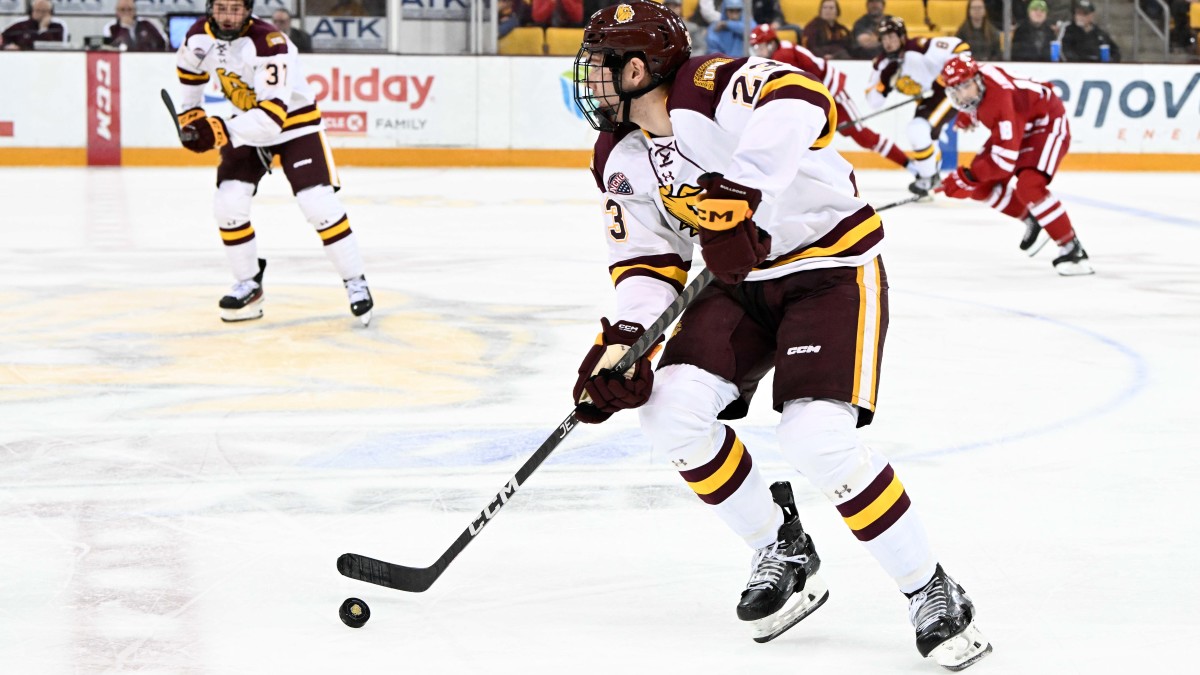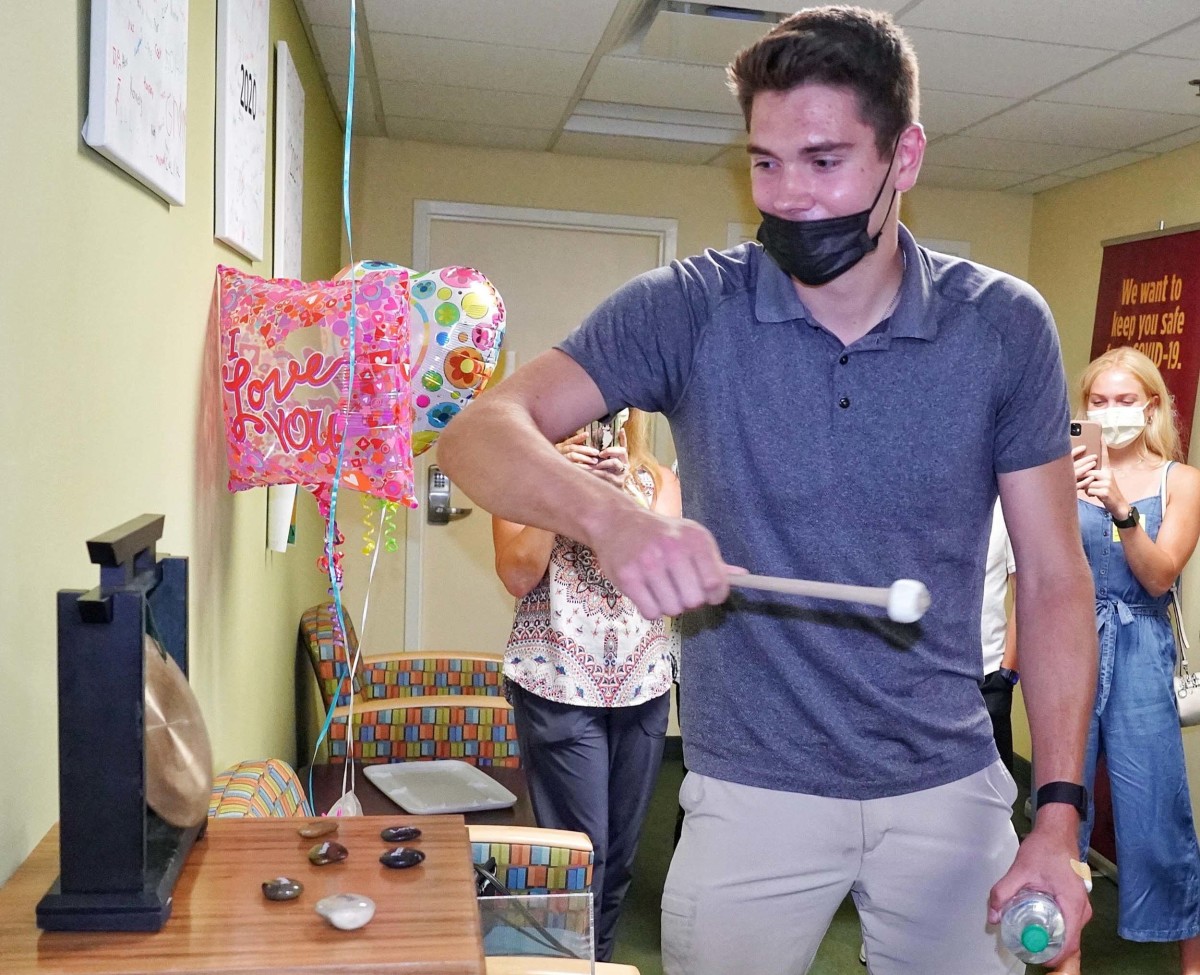An NHL Prospect’s Harrowing Bout With Cancer and Journey Back to the Ice

Hockey defenseman Will Francis sometimes feels like he’s forgetting something at night.
For two years, Francis followed a strict, daily pill regimen that required him to take anywhere from three to 25 capsules, depending on the day of the week. After two intensive phases of chemotherapy, this maintenance plan was put in place to sustain remission. For a total of 848 days, Francis endured treatment for B-cell acute lymphoblastic leukemia. His treatment ended in July, and he still has to remind himself that he isn’t missing his nightly medication.
The Anaheim Ducks selected Francis in the sixth round of the 2019 NHL Draft with the 163rd pick. Previously, Francis played for the Cedar Rapids RoughRiders for two seasons before joining the University of Minnesota-Duluth hockey team. As an NCAA athlete and NHL prospect, Francis can attend the Ducks’ developmental camps only while playing at Minnesota-Duluth.
Last July, Francis attended the camp in California and worked on defensive positioning and gaps. Ducks coach Dallas Eakins asked him to stand up during the camp’s rookie dinner and commended his fight against cancer.
“When we think about having a hard day,” Eakins said, “Will Francis knows what a hard day is.”
Only four days earlier, Francis had completed his final chemotherapy treatment.
“I had no idea that something like that was coming,” says Francis. “It shows how good of a person he is and also just the organization as a whole. I don’t think you can go very far in whatever you’re trying to do in life without being a good person first. And so, you know, that sort of thing was just awesome.”
Francis first stepped on the ice at 2 years old. His dad used boards and netting to create a backyard rink at their Lino Lakes, Minn., home. A year later, his parents signed him up for a skating class, hoping it would burn off the rambunctious toddler’s energy.
“He had this mindset as a little toddler that he was going to do it,” his mother, Heather Francis, says. “He wasn’t going to give up and say, ‘Come and pick me up and take me off the ice.’ He was going to figure out how to do it.”
Once Francis entered kindergarten, his parents signed him up for youth leagues. A family member asked him whether he was excited to start playing in real games, and Francis replied, “I don’t know why he signed me up. I don’t want to play.”

Francis was diagnosed with cancer in March 2020, when he was 19. A jubilant spring break trip to the family’s cabin quickly turned somber when he visited the local hospital after continuous sore throats and fatigue. Tests showed that Francis’s white blood cell count was 178,000; a normal range is 10,000. Doctors informed him the culprit was leukemia.
The star athlete started chemotherapy during the height of COVID-19. The Francis family would stare out the hospital window at the empty Minneapolis city streets that would typically be bumper-to-bumper with traffic. The first four months were the hardest; Francis was receiving high doses of nine different chemotherapies. He spent 56 nights at the hospital, and remission brought more months of aggressive treatment.
Extreme fatigue, muscle pain and nausea are common side effects of chemotherapy. During the most grueling periods of treatment, Francis would ride a stationary bike in the hospital, as the NHL prospect would continuously ask doctors how he could remain active. Only months after the diagnosis, Francis got a summer job driving a Zamboni, simply so that he could touch the ice. He would wave to the crowd while operating the machine at his sister’s hockey games.
On days when Francis felt healthy, he would put on his skates and shoot the puck. His stick skills remained intact, but he occasionally struggled to catch his breath. Sometimes he would play weeknights with his dad’s adult hockey league or his former high school team.
“I think just him being the athlete that he was going into it really helped with how he took on the treatment,” his father, Jeff Francis, says. “We could notice, you know, as month to month would go by and [he’s] coming back. His body’s recovering from the disease.”
When classes started back up in September 2020, doctors recommended Francis take the semester off because of the severity of his phase of treatment. But Francis took 12 hours of class that semester so he could be on track academically when hockey resumed. The maintenance phase of his treatment began at the start of 2021 and introduced a semblance of normalcy back into his life. That summer, Francis attended a Bulldog team camp, the first time he truly stepped back on the ice with a team. The college hockey player was given a jersey with his number.
“He came home and he had his jersey with No. 23 on it,” Heather says. “He was just beaming from ear to ear because he knew he would have that number and he would be part of the team.”
In August 2021, Francis moved back to Duluth for school. Strength and conditioning were a priority for the defenseman.
“Like any other athlete, I always wanted to be bigger, faster, stronger,” says Francis. “I was just having kind of that roadblock of going in for treatment. I’d take three steps forward, and then it would be one step back with treatment.”

He continued treatment and would make the two-hour drive to the Twin Cities for appointments. Occasionally he would miss practice, but treatments were often scheduled around training and class. Managing stamina was a learning curve for both Francis and his coaches. On treatment days, Francis would still show up for practice even if his energy was depleted from the chemotherapy. As the season progressed, the defenseman learned how his body would react on the ice after treatment and how to perform his best during that time. The sophomore appeared in five games for the Bulldogs in the 2021–22 season. Francis recalls how he couldn’t stop moving his feet during his first shift back on the ice, with adrenaline buzzing through his body.
Doctors deemed Francis fully recovered when he rang the bell at Fairview Masonic Children’s Hospital. His blood count numbers are now back to normal, and his improved health has translated on the ice. He performs at such a high level that his new strength and conditioning coach had no idea that he was fighting for his life only two years ago. Coach Scott Sandelin believes that training without interruptions this year has instilled noticeable confidence in Francis. This season the hockey star isn’t worried about hospital visits but is focusing on establishing himself as a dominant collegiate player for the Bulldogs and, maybe one day, the Ducks.
“I can’t even put it into words because it was incredible. I hadn’t seen him play at that point in over two years,” Heather says. “I’ll always think back to the times where he was in the hospital and then to see him doing what he loves so much, to go to that it’s just incredible.”
